< Transfer Experiences < Current Students
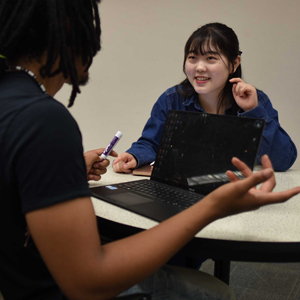
Academic Success Center
The Academic Success Center is dedicated to helping students reach their potential with a UMBC degree. We provide centralized support services to all undergraduate students at UMBC. Through a coordinated approach and an unwavering commitment to student success, the Academic Success Center fosters a welcoming environment that provides a one-stop opportunity through Academic Policy, Academic Learning Resources, and Academic Advocacy for students to achieve their academic goals and claim their future with a UMBC degree.
Visit the Academic Success Center
Advising
At UMBC, every student must meet with an academic advisor each semester prior to registering for classes. Academic advisors can help students plan their academic pathways, discuss internships and study abroad opportunities, and provide support to students throughout their time at UMBC. Academic advisors can also assist transfer students with understanding how their previously completed courses are being applied to their UMBC degree plan.
College of Arts, Humanities, and Social Sciences
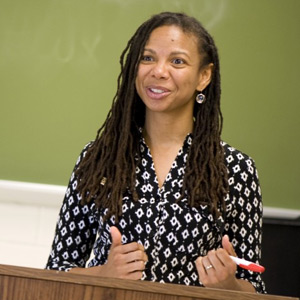 The College of Arts, Humanities, and Social Sciences provides advisement to students in all of our academic disciplines. Our programs utilize faculty advisement as the primary source of advisement and select programs also have professional advisors.
The College of Arts, Humanities, and Social Sciences provides advisement to students in all of our academic disciplines. Our programs utilize faculty advisement as the primary source of advisement and select programs also have professional advisors.
College of Engineering and Information Technology
 In the College of Engineering and Information Technology, Staff Advisors work with students in the Chemical Engineering, Computer Science, Computer Engineering, and Mechanical Engineering majors who have not yet passed their gateway or are first-semester transfer students. We also assist Computer Science minors and students interested in our majors.
In the College of Engineering and Information Technology, Staff Advisors work with students in the Chemical Engineering, Computer Science, Computer Engineering, and Mechanical Engineering majors who have not yet passed their gateway or are first-semester transfer students. We also assist Computer Science minors and students interested in our majors.
College of Natural and Mathematical Sciences
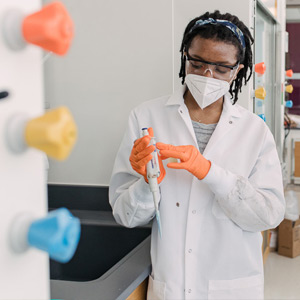 In the College of Natural and Mathematical Sciences, newly or recently declared Life Science majors without an assigned advisor will need to email CNMSAdvising@umbc.edu for support. All advising assignments for returning students can be found their website as well as contact information.
In the College of Natural and Mathematical Sciences, newly or recently declared Life Science majors without an assigned advisor will need to email CNMSAdvising@umbc.edu for support. All advising assignments for returning students can be found their website as well as contact information.
Erickson School of Aging Studies
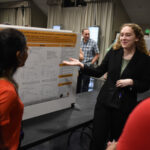 The Erickson School of Aging Studies is the only one of its kind in the country to combine business management, public policy, and the study of human aging. The program is designed to meet the real-world demand for educated, innovative leaders in the longevity market.
The Erickson School of Aging Studies is the only one of its kind in the country to combine business management, public policy, and the study of human aging. The program is designed to meet the real-world demand for educated, innovative leaders in the longevity market.
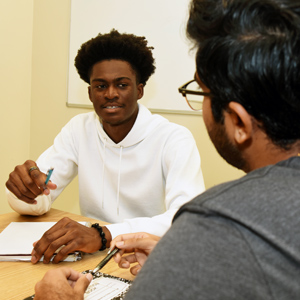 The Baccalaureate Social Work program prepares students for bachelor’s level practice with individuals, families, groups, organizations, and communities. The Social Work program provides a foundation of knowledge and skills for those students who are interested in pursuing graduate studies.
The Baccalaureate Social Work program prepares students for bachelor’s level practice with individuals, families, groups, organizations, and communities. The Social Work program provides a foundation of knowledge and skills for those students who are interested in pursuing graduate studies.
 Did you know that one in three students change their majors within three years of initial enrollment and that one in ten changes two or more times? If you are still exploring majors or transitioning between academic programs, you are in terrific company! Exploratory students are served by the Office of Academic and Pre-Professional Advising.
Did you know that one in three students change their majors within three years of initial enrollment and that one in ten changes two or more times? If you are still exploring majors or transitioning between academic programs, you are in terrific company! Exploratory students are served by the Office of Academic and Pre-Professional Advising.
Are you considering professional school after your undergraduate degree? Meet with an allied health advisor, a pre-medical/pre-dental advisor, or a pre-law advisor to plan your professional school journey!
Develop Academic Relationships
As a student, developing productive academic relationships is an important key to your success!
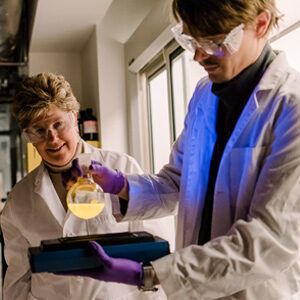 Besides your academic advisor, faculty members, teaching assistants (TAs) and learning assistants (LAs) within your department or college are central to your development as a student. Seek out faculty members and TAs who share your particular interests or inspire you in some way.
Besides your academic advisor, faculty members, teaching assistants (TAs) and learning assistants (LAs) within your department or college are central to your development as a student. Seek out faculty members and TAs who share your particular interests or inspire you in some way.
Over time, they can serve as critical advisors, guides, and mentors for you as you make important academic and career-related decisions. Like any other relationships, productive academic relationships take time and develop at their own pace. Start early; start now. Be patient.

 The College of Arts, Humanities, and Social Sciences provides advisement to students in all of our academic disciplines. Our programs utilize faculty advisement as the primary source of advisement and select programs also have professional advisors.
The College of Arts, Humanities, and Social Sciences provides advisement to students in all of our academic disciplines. Our programs utilize faculty advisement as the primary source of advisement and select programs also have professional advisors. In the College of Engineering and Information Technology, Staff Advisors work with students in the Chemical Engineering, Computer Science, Computer Engineering, and Mechanical Engineering majors who have not yet passed their gateway or are first-semester transfer students. We also assist Computer Science minors and students interested in our majors.
In the College of Engineering and Information Technology, Staff Advisors work with students in the Chemical Engineering, Computer Science, Computer Engineering, and Mechanical Engineering majors who have not yet passed their gateway or are first-semester transfer students. We also assist Computer Science minors and students interested in our majors. In the College of Natural and Mathematical Sciences, newly or recently declared Life Science majors without an assigned advisor will need to email CNMSAdvising@umbc.edu for support. All advising assignments for returning students can be
In the College of Natural and Mathematical Sciences, newly or recently declared Life Science majors without an assigned advisor will need to email CNMSAdvising@umbc.edu for support. All advising assignments for returning students can be  The Erickson School of Aging Studies is the only one of its kind in the country to combine business management, public policy, and the study of human aging. The program is designed to meet the real-world demand for educated, innovative leaders in the longevity market.
The Erickson School of Aging Studies is the only one of its kind in the country to combine business management, public policy, and the study of human aging. The program is designed to meet the real-world demand for educated, innovative leaders in the longevity market. The Baccalaureate Social Work program prepares students for bachelor’s level practice with individuals, families, groups, organizations, and communities. The Social Work program provides a foundation of knowledge and skills for those students who are interested in pursuing graduate studies.
The Baccalaureate Social Work program prepares students for bachelor’s level practice with individuals, families, groups, organizations, and communities. The Social Work program provides a foundation of knowledge and skills for those students who are interested in pursuing graduate studies. Did you know that
Did you know that 